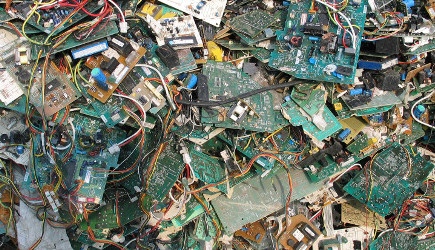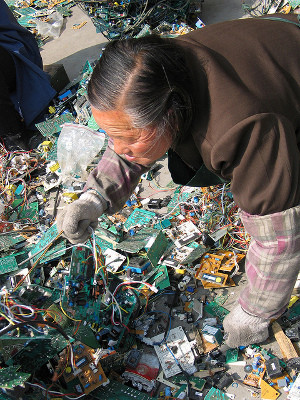E-waste: 10 meter high wall from Oslo to Sicily
September 03, 2015
on
on

65% of Europe's electronic waste is improperly disposed of, posing health and environmental risks and an estimated financial loss of up to €1.7 billion.
Of the 9.5 million tons of waste electrical and electronic equipment (WEEE) Europe produced in 2012, only 35% found its way to official recycle systems. The remaining 6.1 million tons were exported, illegally traded or mismanaged.
Those are the findings of a two year investigation of several stakeholders including Interpol and the WEEE forum. They banded together in the CWIT (Countering WEEE Illegal Trade) project to map e-waste streams and come up with a set of recommendations to improve their management.
“The weight of Europe's mismanaged e-waste alone equals that of a 10 meter high brick wall stretching from Oslo to the toe of Italy. Valuable metals and components, including critical raw materials, need to be safely captured and recycled to the fullest possible extent", said Pascal Leroy, Secretary-General of the Waste Electrical and Electronic Equipment Forum
Roughly 1.5 million tons of used electronics are exported, mostly destined for Africa and Asia. Shipping containers full of discarded parts and used but still functioning electronics are send over for reuse and recycling. The legal status of these shipments is often shady and there is no monitoring of how the e-waste is treated.
Electronic waste can contain toxic substances like mercury, cadmium, chromium and lead. Handling huge amounts of e-waste without protection can cause serious health problems. Without proper storage e-waste can also pollute the environment which in turn can pose health risks as well.

However, most of the e-waste remains in Europe. 750.000 tons are simply thrown away with ordinary trash, another 750.000 tons are scavenged for parts. The remaining 3.1 million tons are recycled under non-compliant conditions within the borders of the EU, covering the entire spectrum from household appliances ending up with scrap metal to criminal business models to dodge compliance fees or extract valuable components.
Rare earth metals used in the production of electronics are becoming increasingly scarce. So much so that urban mining, the recycling of e-waste to extract these materials, has become a profitable business. Urban mining is also necessary to keep the production of electronic equipment going. Shortages are feared for some precious metals like palladium which is used in mobile phones.
The investigators estimate the annual economic loss due to the mismanaged waste streams to range between 800 million and 1.7 billion euros.
In their Summary Report the investigators give several recommendations to improve e-waste management within the EU. Most of these consist of new or stronger law enforcement tools to reduce illegal trade. They would like a National Environmental Security Task Force to coordinate investigation and an Operational Intelligence Management System to collect and share information. On top of that they would like a ban on cash transaction in the scrap metal trade.
Furthermore they propose the implementation of an e-waste treatment system that includes certification and mandatory reporting. And, lastly, they recommend to educate consumers on the importance of proper e-waste disposal.
I vote we start with the last two and see how that goes before we move on to the Big Brother type of actions.
Images: baselactionnetwork, CC-BY license.
Of the 9.5 million tons of waste electrical and electronic equipment (WEEE) Europe produced in 2012, only 35% found its way to official recycle systems. The remaining 6.1 million tons were exported, illegally traded or mismanaged.
Those are the findings of a two year investigation of several stakeholders including Interpol and the WEEE forum. They banded together in the CWIT (Countering WEEE Illegal Trade) project to map e-waste streams and come up with a set of recommendations to improve their management.
“The weight of Europe's mismanaged e-waste alone equals that of a 10 meter high brick wall stretching from Oslo to the toe of Italy. Valuable metals and components, including critical raw materials, need to be safely captured and recycled to the fullest possible extent", said Pascal Leroy, Secretary-General of the Waste Electrical and Electronic Equipment Forum
Health risks
Roughly 1.5 million tons of used electronics are exported, mostly destined for Africa and Asia. Shipping containers full of discarded parts and used but still functioning electronics are send over for reuse and recycling. The legal status of these shipments is often shady and there is no monitoring of how the e-waste is treated.
Electronic waste can contain toxic substances like mercury, cadmium, chromium and lead. Handling huge amounts of e-waste without protection can cause serious health problems. Without proper storage e-waste can also pollute the environment which in turn can pose health risks as well.

However, most of the e-waste remains in Europe. 750.000 tons are simply thrown away with ordinary trash, another 750.000 tons are scavenged for parts. The remaining 3.1 million tons are recycled under non-compliant conditions within the borders of the EU, covering the entire spectrum from household appliances ending up with scrap metal to criminal business models to dodge compliance fees or extract valuable components.
Urban mining
Rare earth metals used in the production of electronics are becoming increasingly scarce. So much so that urban mining, the recycling of e-waste to extract these materials, has become a profitable business. Urban mining is also necessary to keep the production of electronic equipment going. Shortages are feared for some precious metals like palladium which is used in mobile phones.
The investigators estimate the annual economic loss due to the mismanaged waste streams to range between 800 million and 1.7 billion euros.
Managing e-waste
In their Summary Report the investigators give several recommendations to improve e-waste management within the EU. Most of these consist of new or stronger law enforcement tools to reduce illegal trade. They would like a National Environmental Security Task Force to coordinate investigation and an Operational Intelligence Management System to collect and share information. On top of that they would like a ban on cash transaction in the scrap metal trade.
Furthermore they propose the implementation of an e-waste treatment system that includes certification and mandatory reporting. And, lastly, they recommend to educate consumers on the importance of proper e-waste disposal.
I vote we start with the last two and see how that goes before we move on to the Big Brother type of actions.
Images: baselactionnetwork, CC-BY license.
Read full article
Hide full article


Discussion (0 comments)